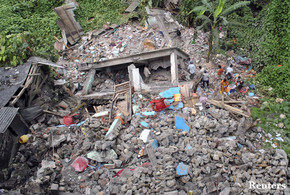The devastating earthquake in Nepal over the weekend has already touched the hearts of millions of Americans who want to support disaster relief through donations. BBB advises donors to avoid being taken advantage of by questionable solicitations or wasting their money on poorly managed relief efforts.
“The news out of Nepal is horrific and the photos are heart-breaking,” said H. Art Taylor, president and CEO of the BBB Wise Giving Alliance. “People want to help as soon as possible, and that is wonderful, but donors need to follow some key rules about supporting disaster relief so that their gifts get to those who need them most.”
Across the world, relief and development organizations and governments have begun responding to the earthquake in Nepal. American charities have also begun accepting donations to assist in the region. Before you choose a charity to give to, take a look at our tips for giving to this type of cause (below) and remember to check out the charity on Give.org. The list below includes nationally soliciting charities that have been accredited by BBB WGA (i.e., meet all 20 BBB Charity Standards) and indicate that they are collecting contributions to assist Nepal relief efforts:
•ActionAid USA
•Adventist Development and Relief Agency International
•American Jewish Joint Distribution Committee
•American Jewish World Service
•American Red Cross
•AmeriCares Foundation
•Brother’s Brother Foundation
•CARE USA
•Catholic Relief Services
•Church World Service
•Concern Worldwide US
•Direct
Global Impact
•GlobalGiving Foundation
•Habitat for Humanity International
•HOPE worldwide
•Humane Society International
•International Medical Corps
•Islamic Relief USA
•Lutheran World Relief
•MAP International
•Medical Teams International
•Mercy Corps
•Operation USA
•Oxfam America
•Plan International USA
•Project Concern International
•Salvation Army (National Corporation)
•Save the Children Federation
•Seva Foundation
•SOS Children’s Villages-USA
•United States Fund for UNICEF
•World Food Program USA
•World Neighbors
•World Relief
•World Renew
•World Vision
BBB Wise Giving Alliance offers donors these tips for disaster relief giving:
Be cautious when giving online. Be cautious about spam messages and emails that claim to link to a relief organization. If you want to give to a charity involved in relief efforts, go directly to the charity’s website. In response to Katrina and Haiti earthquake , the FBI and others raised concerns about websites and new organizations that were created overnight, allegedly to help victims.
Rely on expert opinion when it comes to evaluating a charity. Be cautious when relying on third-party recommendations such as bloggers or other websites, as they may not have fully researched the relief organizations they list. The public can go to www.give.org to research relief organizations and other charities to verify that they are accredited by the BBB which means they meet the 20
Standards for Charity Accountability.
Be wary of claims that 100 percent of donations will assist relief victims. Despite what an organization might claim, charities have fund raising and administrative costs. Even a credit card donation will involve, at a minimum, a processing fee. If a charity claims 100 percent of collected funds will be assisting earthquake victims, the truth is that the organization is still probably incurring fund raising and administrative expenses. It may use some of its other funds to pay these costs, but the expenses will still be incurred.
Find out if the charity has an on-the-ground presence in the impacted areas. Unless the charity already has staff in the affected areas, it may be difficult to bring in new aid workers to provide assistance quickly. See if the charity’s website clearly describes what the charity can do to address immediate needs.
Find out if the charity is providing direct aid or raising money for other groups. Some charities may be raising money to pass along to relief organizations. If so, you may want to consider “avoiding the middleman” and giving directly to those that have a presence in the region. Or, at a minimum, check out the ultimate recipients of these donations to see whether they are equipped to provide aid effectively.
Gifts of clothing, food or other in-kind donations. In-kind drives for food and clothing, while well intentioned, may not necessarily be the quickest way to help those in need – unless the organization has the staff and infrastructure to distribute such aid properly. Ask the charity about its transportation and distribution plans. Be wary of those who are not experienced in disaster relief assistance.

